 |
|
Nathaniel Hawthorne wrote some of the first and best speculative fiction you're going to read. 'Rappacinni's Daughter' is a haunting tale of romatic terror. |
|
|
|
Speculative Romance
The Agony Column for December 6, 2002
Commentary by Rick Kleffel
"WHEN a writer calls his work a Romance, it need hardly be observed that he wishes to claim a certain latitude, both as to its fashion and material, which he would not have felt himself entitled to assume had he professed to be writing a Novel. The latter form of composition is presumed to aim at a very minute fidelity, not merely to the possible, but to the probable and ordinary course of man's experience. The former-while, as a work of art, it must rigidly subject itself to laws, and while it sins unpardonably so far as it may swerve aside from the truth of the human heart-has fairly a right to present that truth under circumstances, to a great extent, of the writer's own choosing or creation. If he think fit, also, he may so manage his atmospherical medium as to bring out or mellow the lights and deepen and enrich the shadows of the picture. He will be wise, no doubt, to make a very moderate use of the privileges here stated, and, especially, to mingle the Marvelous rather as a slight, delicate, and evanescent flavor, than as any portion of the actual substance of the dish offered to the public. He can hardly be said, however, to commit a literary crime even if he disregard this caution." Nathaniel Hawthorne, Preface to 'The House of Seven Gables'
 |
|
Nathaniel Hawthorne wrote some of the first and best speculative fiction you're going to read. 'Rappacinni's Daughter' is a haunting tale of romatic terror. |
By Nathaniel Hawthorne's measurement, all speculative fiction is Romance. In contrast, these days Romance is regarded as the realm of the girly-girl Harlequin paperbacks, big business but not normally the subject of literary notices. Hawthorne of course was speaking of the Romantic Movement in literature, which had started in the late 1700's and ran through the early 1800's, whose founding fathers included William Blake, William Wordsworth and John Keats. The Romantics emphasized emotions, imaginations, the individual, nature and spontaneity. Harlequin, on the other hand is a big business for whom the term 'Romance' emphasizes sales figures, pie charts, and conscientious writers churning out a heavily defined end product. Depending on the venue, the term Romance can spark respect or disdain.
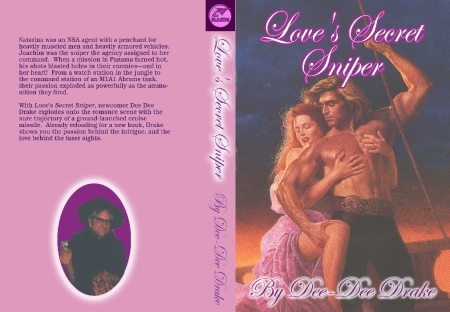 |
|
David Drake won my heart with this hilarious fake Romantic novel cover. Yet another wildly popular and well-known SF writer that I've never gotten round to reading, Drake's website has a series of fake book covers that show this author to have a superb sense of humor about himself, always an important authorial trait. |
It's usually the latter. Those with interests in literary speculative fiction are not going to jump for a work just because they know it's a romance. In fact, romance is usually not considered a desirable element of the kind fiction that sees its way into these columns. Of course, that's not strictly true, and my recent reading had pounded the point home. All the fiction I read is Romance. What I've seen recently however is that Romance of the Harlequin variety is getting skillfully integrated into the speculative fiction by talented writers who know what they're doing and what they're using. By bringing in the Romance, they're getting back to the basics of the Romantic Movement, pulling in from the wide-screen space and sword operas and focusing on the individuals and their emotions. Romance can actually improve your reading life.
Of course, it's old news that Romance plays a big part in the sales of speculative fiction. Look at the back of just about any fantasy that doesn't feature a guy with a sword on the cover, and you're likely to see a blurb from a Romance-oriented reviewer or publication. And the hard-core Romance publishers are charging at the genre publishers, incorporating science fictional themes in the latest generation of bodice-rippers. No, Dee Dee Drake isn't getting published yet, but it's only a matter of time. The mid-ground fiction that keeps the mills churning and the books moving solidly into and out of bookstores is getting weirder every day. And every bit of weirdness that gets into those books brings their readers closer to some truly sublime weirdness. On one side of the spectrum, Harlequin will always have novels of pure romance, while Tor will always have David Drake. Or is that Dee Dee?
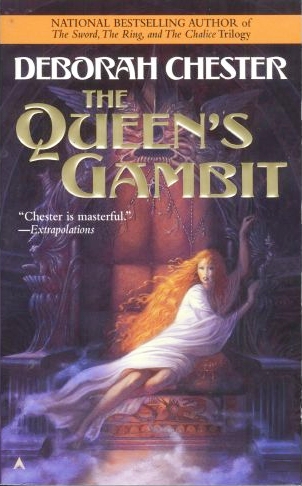 |
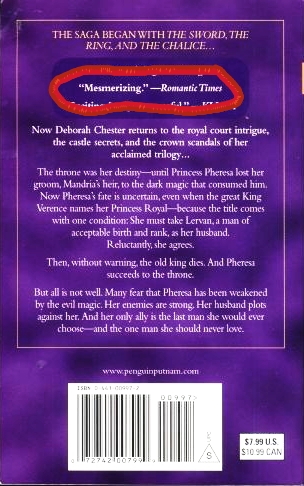 |
|
The girly cover is a pretty strong clue.... |
..but the back cover gives it away. Note the lipstick ring.... |
Romance has always played a part in standard speculative fiction, but too often it's merely perfunctory. The male (or female) protagonist of just about any novel published these days will almost be required to meet and mate with a female (or male, you do the gender matching). But this lovey-dovey relationship is usually only the hood ornament on the reading vehicle, while a same (or different) sex conflict is the engine. If we call these mating pairings romance, for the sake of simplicity, then it's clear that romance has gotten the short shrift from genre fiction for a long time. But a bevy of authors have recently seen fit to move the emotions to center stage. The results are as felicitous for the reader as they usually are for the characters.
The writers here are mainly manly men, and it's interesting to note that many of the men who populate these new romances are something along the lines of complete cads. In some cases they get their comeuppance, in others they get the girls and the gold watch. Yes, some of these men are really rather nice, just conflicted about the need to fight monsters, finding it hard to fit kids and marriage into their busy monster-fighting schedule. You'll have to check your expectations at the door when you get into speculative romance. The novels that look set to deliver Cheese and Cake might be more likely to deliver love and marriage, while the serious novels of speculative fiction might have chapters that could start off 'Dear Penthouse, Last night I just couldn't believe what happened. I was with...' It's a whole new world out there of sensitive shits, adorable gits and tenderhearted twits. Fortunately, you don't have to like the characters to enjoy the books. But it helps. Manly men -- get out your notebooks. You're going to want to write some of this down.
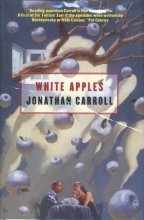 |
|
Jonathan Carroll is the kind of author that would instantly hit the bestseller list in a just alternate universe. You can hear him read from the novel in this interview. |
If sublime and weird romance is apparently the order of the day, then the leader of the pack is clearly Jonathan Carroll. Embodying the strengths of both ends of the Romantic spectrum and a few others never seen on earth, Carroll has informed all his novels with a passion for the complexities of the attractions between men and women. He's in top form in 'White Apples', an extravagantly imaginative take on love, destiny, life and death. 'White Apples' is the tale of Vincent Ettrich, a Man Who Loves Women in all their guises, wholeheartedly if not wholesomely. Complimented by Coco, his spiritual guide, Isabel, his true love and Kitty, his ex-wife, Ettrich revels in witty conversations and lovely memorable emotional gestures. Who is actually dead, who is actually alive, who exists the past, present and future is shaken, not stirred to create a literary martini with head-bending skill. Carroll informs the imagination with the heart and the heart with the imagination. His magically re-worked reality enables him to front load this novel with breath-taking imaginative supernatural leaps and witty repartee. The bonds between lovers that were, lovers that are and lovers that will be are spun on a loom of wild philosophy and illuminated by jaw-dropping analogies. Carroll wants the readers' heads and hearts to spin out of control. When you come down from the high, you can still remember the panoramic view along with some choice lines of dialogue. Carroll actually takes a very science fictional look at the possibilities of fate and romance, and permutes them with complete abandon. 'White Apples' could easily be seen as the cornerstone of a genre readers could call sophisticated supernatural romance. No matter what you call it, his prose is always a joy to read. Clever is only the beginning.
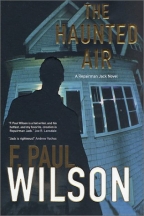 |
|
F. Paul Wilson's Repairman Jack series is well-served by this, the best installment yet. |
F. Paul Wilson's Repairman Jack is a man without a name, without an identity. But he is not without a woman in his life, Gia, and her nine year old daughter Vicki. Jack may have foiled the Rakoshi, demons from east India, a sentient disease, Lovecraftian monstrosities and numerous other foes human and otherwise, but in his latest novel 'The Haunted Air', he finds himself stymied not by monsters but by love. Yes, Repairman Jack has bigtime girlfriend problems, and even fake spiritualists, real sorcerers and vengeance-seeking gypsies pale before the problems posed by Gia. Jack's on-going romance plays a lynchpin role in Wilson's latest, and it's a delight to see the usually serene Jack flustered by his inability to come up with a solution to the problems that she poses. Wilson's arranged a number of treats in this novel, from the enjoyable fake spiritualists Lyle and Charlie Kenton to the despicable Eli Bellitto. Wilson creates a large number of subplots in 'The Haunted Air', even for a Repairman Jack novel, which usually feature at least two distinct threads. Here, he juggles plots like a Las Vegas showman, allowing the reader to see and enjoy every move without ever twigging to his secrets until its time.
The focus on romance in 'The Haunted Air' is a particular delight. Repairman Jack novels tend to swerve into fairly heavy political territory, since Jack is something of the ultimate Libertarian. Now his politics-- and business -- have to fight with his girlfriend, and it's a distinctly uneven match. The result for this novel is that Jack becomes more of a character that men can identify with, and a character that women can identify. It's all about identity, isn't it? Repairman Jack has never had an official identity. But for the past five years, Wilson has been slowly reigning Jack in, devoting novels to the character, giving him a sister and a father. Now Jack can see the walls closing in on him. His usual aplomb is shattered. Wilson is clearly having a lot of fun, and he passes that on to the reader.
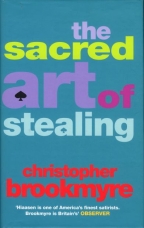 |
|
Christopher Brookmyre brings back the lovable Angelique De Xavia in his latest novel. Unfortunately for her, she falls for a surrealist artist and thief. |
Of course, few writers can have more fun than Christopher Brookmyre. In 'The sacred art of stealing', he's obviously having a blast, though Angelique De Xavia, the black woman cop who thwarted terrorists in 'A big boy did it and ran away' is not. At its heart, 'The sacred art of stealing' is a love story pairing De Xavia with Zal Innez, a remarkably clever artist who happens to be a first rate thief. But this is a love story for manly men, and you need read no further than the scabrous, scandalous first paragraph to get that straight. Women will need to set their man-o-meter tolerance level to Galactic, but once they get past the rant of Harry the hired killer that opens the novel, they'll a) look forward to his further rants, which are side-splittingly funny, b) meet up with a disaffected De Xavia, who, having saved the day, finds that the day after is not so keen.
Brookmyre displays an excellent and sympathetic insight into the woman's side of the romantic bargain in 'The sacred art of stealing'. Between gripping scenes of toe-tapping tension, carefully orchestrated heists that play like a combination of 'Monty Python' and 'Die Hard', and more magically-oriented misdirection than a commercial for a new sports car, Brookmyre crafts a witty meeting of two most-entertaining minds. With characters as engaging as De Xavia, Zal, and yes, Harry (he never meets Sally), this novel delivers likable people engaged in unavoidable though ill-advised romances. You get the full spectrum of romantic involvement, from "one of the very few consumer transactions in which you really did get what you paid for, no more and no less" to "'I know, I'll hook up with a bank robber -- me being a cop, that sounds like a long-term stable relationship in the making'". If you happen to be a surrealist artistic bank robber, or a black woman terrorist-fighting cop, there's lots of sage advice in here for you. And if not, then there's just a lot of great reading.
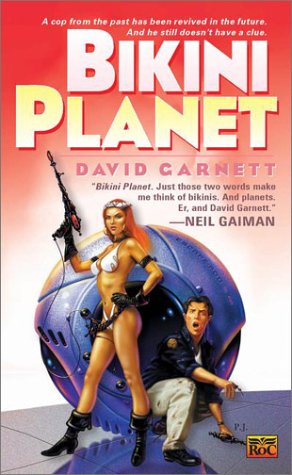 |
|
As the result an email campaign, I've been forced to put in the larger-sized version of this image. |
If you're looking for romance in the least likely of places, you can do no better than David Garnett's 'Bikini Planet'. Well, yes, it's true, I've been looking for a reason to put that book cover in a column again for almost a ten months now. And what better chance than this, in a column on romance. That's because in spite of the cover, 'Bikini Planet' is a romance through and through. Sex is usually pretty much off-screen. Garnett's tale of an inept Las Vegas policeman who wakes up in a scantily-clad future jumps between 'Naked Gun' style dialogue and an inevitable pairing of the hero and the heroine. But what's shocking is not the girls, girls, girls, but the weddings, weddings, weddings. This novel looks like a prime slice of cheesecake, but it delivers a sweet little romance with a wife-approved ending in which an ENTIRE PLANET is devoted to providing top-notch facilities for getting married. I shit you not. Like the 'Naked Gun' movies, the jokes fly fast and furious, and a few of them land flopping on the ground like fan mail from some flounder. No, this is not a novel to end all novels, a novel to end all bikinis (thank whatever gods may be for that!) or weddings. But now, if you get caught reading it, now you can explain that it's really all about getting married. Really!
 |
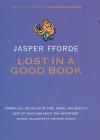 |
|
Jasper Fforde's Thursday Next is a romantic heroine whose literary adventures will delight every English major in the house. |
'Lost in a Good Book' actually manages to be better than the stellar first novel in this series. |
Of course, you should probably be hiding 'Bikini Planet' under your copies of 'The Eyre Affair' and 'Lost in a Good Book'. When it comes to sweet, silly and very-acceptable-to-men romantic heroines, you cannot do any better than Jasper Fforde's creation Thursday Next. Tough, vulnerable and as witty as a dozen Doug Adams books Fforde's heroine is a literary detective who rescues characters kidnapped from novels. The first novel in the series about this book-hopping detective concludes in nuptials all around. And while it might sound a bit like I'm giving something away here, there's no way to give away Fforde's wonderfully witty writing style and endlessly inventive worlds. They simply must be read to be believed, and once you've read them, you'll find yourself re-reading the best bits again and again. Fforde masterfully strikes the balance between affection-seeking, affection finding, and all the silly behavior generated in the process. He carrots and sticks with the best of them. And though romance and all its meanderings is core to both novels, the ultra-cool literary veneer is certain to appeal every literature fiend and book hound who ever cracked a Shakespeare play. The sequel to 'The Eyre Affair', 'Lost in a Good Book' actually manages to up the ante by improving on the first novel, offering more literary references than the original. Those that come up -- Kafka and Carrol to name two -- are done with to-die-for panache. 'Lost in a Good Book' is expected stateside in January. Reserve your copy now, and hope that the publishers eventually let Fforde release more than one book a year.
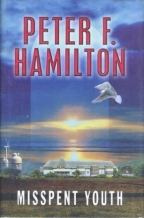 |
|
Peter F. Hamilton's latest novel 'Misspent Youth' is a sharp departure from his previous work. |
Peter F. Hamilton is not the name that you'd expect to end up in a column on Romance in speculative fiction. While romance does play a part in both 'Fallen Dragon' and the 'Night's Dawn Trilogy', it's fairly small compared to the amount of alien mayhem he so effectively wreaks. Apparently however, Hamilton is up to a fairly similar amount of romantic mayhem and he lets himself loose in the domestic arena in his latest novel, 'Misspent Youth'. Instead of the far future, we've got the near future. Instead of a huge cast, we've got a family about to go nuclear. Jeff Baker is the father of the datasphere, the successor to the Internet. He's an elderly man who has benefited from the anti-aging treatments available in the United Europe of 40 years in the future. He's got a drop-dead gorgeous ex-model wife nearly 40 years younger than he and a teenaged son fully in the throws of hormonal madness. All he needs to make his life incredibly complex and filled with farcical complication is to be rejuvenated back to a twenty-something youth himself. That's what happens in this viagra-powered 21st century take on 'The Picture of Dorian Gray', whose characters tell one another "Don't confuse sex with love!" then proceed to do exactly that themselves.
Hamilton gets down and dirty --though not too dirty, at least not at first -- as he runs through the permutations and predicaments of his rich-bastard characters. Though Jeff Baker has a lot of experience, he finds that it's no match for the hormonal flux that powers him through wife, mistress and then bevies of beauties. As his judgement blurs, and his son's behavior follows a very familiar course for the modern teenager of binge-drinking and deep depression, Hamilton has a field day with his cadly characters. Yes, the women are for the most part hot and nubile, but the largely male audience of Hamilton's work is unlikely to notice. Hamilton moves things along briskly and with a fair amount of skill. He nurtures the reader's outrage until it is burning out of control. Even the well-orchestrated riots that follow are no match for what the readers will want done to these twits. Americans will be happy to know that Hamilton has the US firmly in the grip of the Religious Right, ready to crush these cads given half a chance. Not everyone will love this novel, but once you start reading it you'll be hard pressed to stop. It's a well written, gripping button-pusher that puts romance in the fry pan, turns up the heat then walks away and watches what happens.
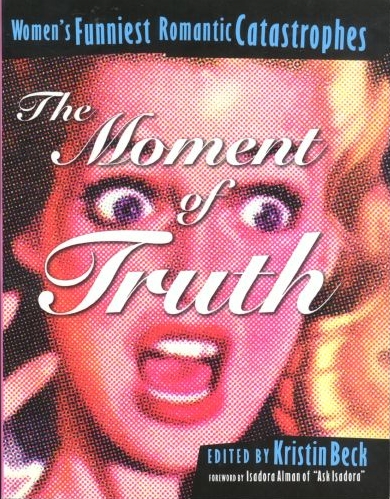 |
|
If you pick this collection up in a bookstore and read it the chances are you'll find something funny. It's very well written and full of variety. It's about you, however. Alas. |
Of course, the same small bookstores who are currently stocking this UK title are the same ones who supply the antidote. I came across 'The Moment of Truth: Women's Funniest Romantic Catastrophes' in the Mark Ziesing catalogue. Edited by Kristina Beck this is 22 essays by women detailing their always hilarious romantic catastrophes. Most of the male readers of this column will find themselves here in one form or another. I qualify for "How could you have known that he'd show up in date number two (and three, and four) in the same outfit?" Yes, there's a row of white shirts and a row of jeans in my closet and that's about it. In the spirit of equality, a number of the essays detail experiences with other women. So we get 'Dead Girl', and for anyone has ever dated or known a fan of the Grateful Dead, you will be so there that you might hurt yourself laughing. The essays are very witty, very funny and cover a lot of ground. They may be the closest thing to a book version of the one-pound tub of chocolate ice cream (or the 40 ounce malt liquor) that readers are going to be able to find. Open anywhere in this book, read a paragraph, and you're going to laugh. Possibly at yourself, but that's the chance you have to take.
Once they've run the gamut of recent romantic speculative fiction, readers may want to retreat into the more familiar shell of silly space operas or humorous monster hunting. But one thing is certain. Having identified the spice of life and seen it used as the main ingredient in a number of recipes both disastrous and felicitous, in books subtle, sublime, sleazy and salacious, it's certain it will not go unnoticed in the future. And in case it does, just remember Nathaniel Hawthorne's take on the matter. It's all Romance. You will be wise to make a very moderate use of the privileges here stated. But you can hardly be said, however, to commit a literary crime even if you disregard this caution.
Thanks,
Rick Kleffel